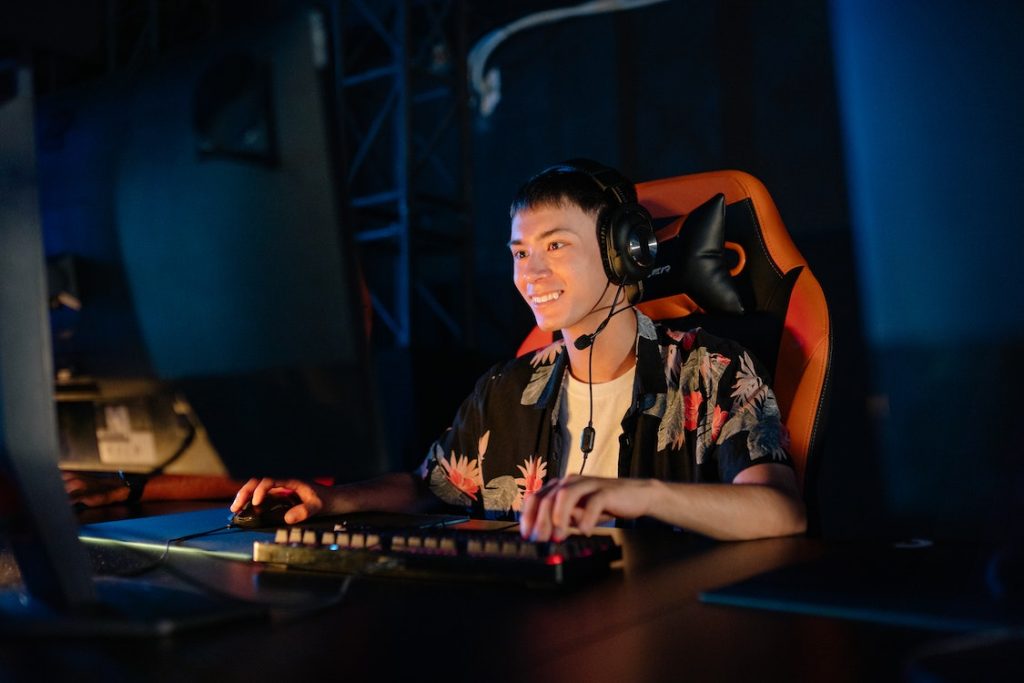Stress can be an extremely detrimental contributor to mental health. It can result in irritability, poor concentration and even physical illness – making gaming an engaging activity which helps relieve this pressure and provide some much-needed relaxation. Gaming provides an engaging escape that provides relief through engaging both mind and body.
According to a study, young adults who play violent video games for extended periods are better at handling stress than non-gamers. Furthermore, playing can help gamers enter an “flow state”, helping them experience moments of meditation or relaxation while gaming.
Engaging in creative activities

Video gaming provides players with an outlet to relieve stress through creative activities like role-playing games, Minecraft building and puzzle solving, or solving sudokus. Engaging in these creative activities helps improve problem-solving abilities as well as create a meditative state similar to meditation. However, gamers must not allow video games to become their main source of entertainment; playing too much could harm one’s health in ways such as poor hygiene, weight gain, eye problems and sleep disturbances – in addition to leading to less socialization and exercise needed for stress reduction.
University of Central Florida researchers discovered that taking short gaming breaks can both reduce stress levels and enhance cognitive performance. Researchers had 66 participants complete an intensive computer-based task for five minutes before being given the choice between either sitting quietly or playing a video game – those that chose video gaming performed significantly better than those who chose not to break from work at all.
Video games have long been used as an enjoyable form of relaxation for people from all backgrounds, providing temporary relief from everyday life and offering temporary escape from stressful moments. Although gaming provides temporary respite from stress levels, its presence in the home may cause division or conflict – for instance some parents worry that their child spends too much time gaming which may lead to issues between teachers and parents, or even potentially violent outcomes.
Studies have revealed that playing video games can stimulate gray matter activity in the brain, contributing to motor skills, memory and emotional responses. Furthermore, video games provide a great way of relieving stress by creating an environment which supports feelings of competence and accomplishment – something not possible with assignment completion or goal attainment.
Boosting self-esteem
Online gaming refers to playing video games over the internet using PCs or mobile devices, enabling players to connect and compete against one another online. While critics may accuse it of creating gaming addiction, online gaming can also help people relax and improve their health. There are various benefits associated with it as well, including stress relief and socializing with others online. There’s something available for every taste ranging from puzzle games to shooters; find one you enjoy playing that will help relieve your tension! The key is finding something you enjoy doing to find that will help relieve your tension online!
Online gaming can not only provide a fun social activity, but can also boost your self-esteem by making you feel accomplished and in control of your situation. For instance, winning battles through skillful tactics and strategies can increase self-esteem; such feelings of accomplishment may help alleviate stressful situations in life.
Studies have also demonstrated that those who spend more time playing video games reported increased levels of happiness and wellbeing than those who played less frequently, likely as a result of in-game relationships providing opportunities for emotional support; two fifths of study participants said they discussed sensitive matters with their gaming friends but not real life friends (Cole and Griffiths 2007).
Researchers recently conducted a survey during the COVID-19 pandemic where over 2,000 adults were asked whether online gaming had helped or hindered their wellbeing. Results of this research demonstrated that those who engaged in gaming for more than one hour per day reported lower levels of wellbeing; however, those who played less may actually benefit more as having strong social connections could play a vital role in alleviating depression and stress.
Creating inclusive communities
Video games are an enjoyable form of entertainment and can serve as an effective form of stress relief. They also allow people to connect socially, particularly within online gaming communities where players from all around the globe interact and share experiences – something which may help those experiencing isolation during pandemics gain support and feel less alone.
Studies have consistently demonstrated the therapeutic effects of gaming to alleviate stress. Playing multiplayer games together has been shown to significantly lower stress levels, while the social aspect of online gaming enables gamers to connect with others who share similar interests – creating feelings of community belonging and belonging which in turn reduce stress and depression.
Online gaming has become an increasingly popular activity among young people, possibly due to its social aspect and creative outlet. Many gaming communities strive to foster a positive gaming experience for players while encouraging players to be kind and respectful – this helps prevent toxic gaming communities and makes gaming an overall more pleasurable experience for all involved.
Gaming online can provide players with both social interaction and the chance to learn and grow, both through social interaction as well as learning new games. Game developers often create forums where players can discuss their experiences and give feedback, which allows players to become better players as they gain confidence within each game they play while feeling a sense of achievement and pride when participating.
Gamers can leverage their skills to foster community by contributing content to the gaming world. They can write guides or tutorials, record gameplay videos, contribute to community wikis or host their own gaming events, creating an experience with deeper roots than simply the digital one.
Though online gaming has seen tremendous growth, it still falls far short of being inclusive for everyone. Progress has been made towards diversity promotion within the industry and many initiatives exist to assist players of color find their place within it – such as when Red Bull partnered with ESA (Entertainment Software Association) to support Black gaming creators within its gaming community and when Red Bull established an initiative dedicated to women gaming creators.
Providing a meditative or “flow state” of mind
Many gamers use video gaming as part of their daily routine, providing both entertainment and relaxation while providing a sense of accomplishment and achievement for the reasons described in this article. Gaming also helps relieve stress by stimulating dopamine production in the brain which has been shown to boost mood, self-esteem and overall well-being. Unfortunately, gaming may cause social isolation or addictive behaviors but there are ways to manage these risks effectively.
Finding your gaming flow has many benefits, including improved concentration and learning. Doing so can help with work or hobby concentration and can increase speed at which tasks are completed while helping retain more knowledge learned. Furthermore, being immersed in flow allows executive functions of the brain to relax more, enabling fast reactions without interference – you’ve likely experienced this sensation while playing sports games, listening to music or creating artwork!
Another advantage of finding flow is that it allows you to form strong relationships with other players even though you never meet in person. People who find it challenging to form or maintain real-life relationships due to social anxiety, introversion or mental health conditions often find that online gaming makes communicating and creating friendships much simpler.
Although gaming can provide a welcome way to relax, it should not be seen as a long-term solution to managing stress. Instead, engaging in activities that promote physical health and social well-being – such as regular exercise – and address its source can be more effective. For example, gym membership or picking up an enjoyable sport are both great stress relievers; you could also try going for walks, playing with pets, gardening etc as ways of relieving tension.




